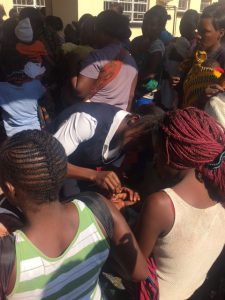“An ounce of prevention is worth a pound of cure” – Benjamin Franklin
Recently, prevention has been a large focus of healthcare. Rightfully so, there is a drive to prevent diabetes, heart disease, cancer, obesity, and high blood pressure. These are all killers. They take lifestyle changes and years of constant vigilance to prevent through changed behaviors. They involve eating healthy on a daily basis, exercising frequently, giving up vices, and other constant measures that accumulate wellness over years and decades to save lives.
This is not the case with vaccines. Vaccines can save lives, and prevent a variety of illnesses, in a handful of moments. Because of this, they are one of the most cost-effective healthcare interventions that exist today. Ironically, this may be part of the reason that vaccines are taken for granted in parts of the world, such as the U.S., where many people born after 1975 had never seen the consequences of measles, rubella, or polio. This may explain why we are seeing outbreaks of measles, and the devastating neurological effects that come with it, among children in the U.S. for the first time in decades. This realization was further solidified during my trip to Zambia with the UN Foundation’s Shot@Life initiative. I saw mothers walking upwards of four hours in the sub-Saharan heat to vaccinate their children. They had seen the consequences of forgoing vaccines, and so there was no question in their minds to protect their children. Whereas, I often have to convince, and at times implore, families in the U.S. to vaccinate their children.
Similar to measles, rubella is a highly contagious airborne virus. In adults, it may give you cold or flu-like symptoms. However, if a pregnant mother passes rubella to her child, they can develop severe ailments such as deafness, cataracts, heart disease, and brain damage. Again, all of which are preventable by vaccine. It is important that everyone is immunized against rubella, as pregnant women, and babies less than nine months old, cannot receive the vaccine. Yet, pregnant women and infants are most vulnerable to catching rubella (from someone who has not been vaccinated) during this time.
Although rubella is no longer endemic in the U.S., 110,000 children were born with rubella worldwide in 2015, and approximately 49,000 were in India alone. In February 2016, India launched a campaign to ensure that children also receive rubella vaccines when receiving measles vaccinations. Their hope is to eliminate this illness by 2020. India is already seeing large decrease in measles associated deaths, and the country hopes to see the same success with the joint measles-rubella campaign. According to the World Health Organization, “a single dose of rubella vaccine can give more than 95% lasting immunity” As an immunologist, I see people die and suffer on a daily basis from illnesses that cannot be prevented, such as cancers or immune deficiencies, that render them unable to respond to vaccines. With 95% odds, this is a bet worth taking.
In an age of globalization, India is as accessible to Americans as New York, Florida, or California. Thus, an outbreak in India may as well be in America. It is refreshing to see the globe move towards the elimination of so many preventable diseases that impact our youngest and most vulnerable population. Vaccination is also a healthcare decision that has affects beyond the individual. Let’s hope the nations who have eliminated preventable illnesses can hold up their end of the bargain in herd immunity and that parents continue to choose vaccination. Together, globally, we can give every child a shot at life.

